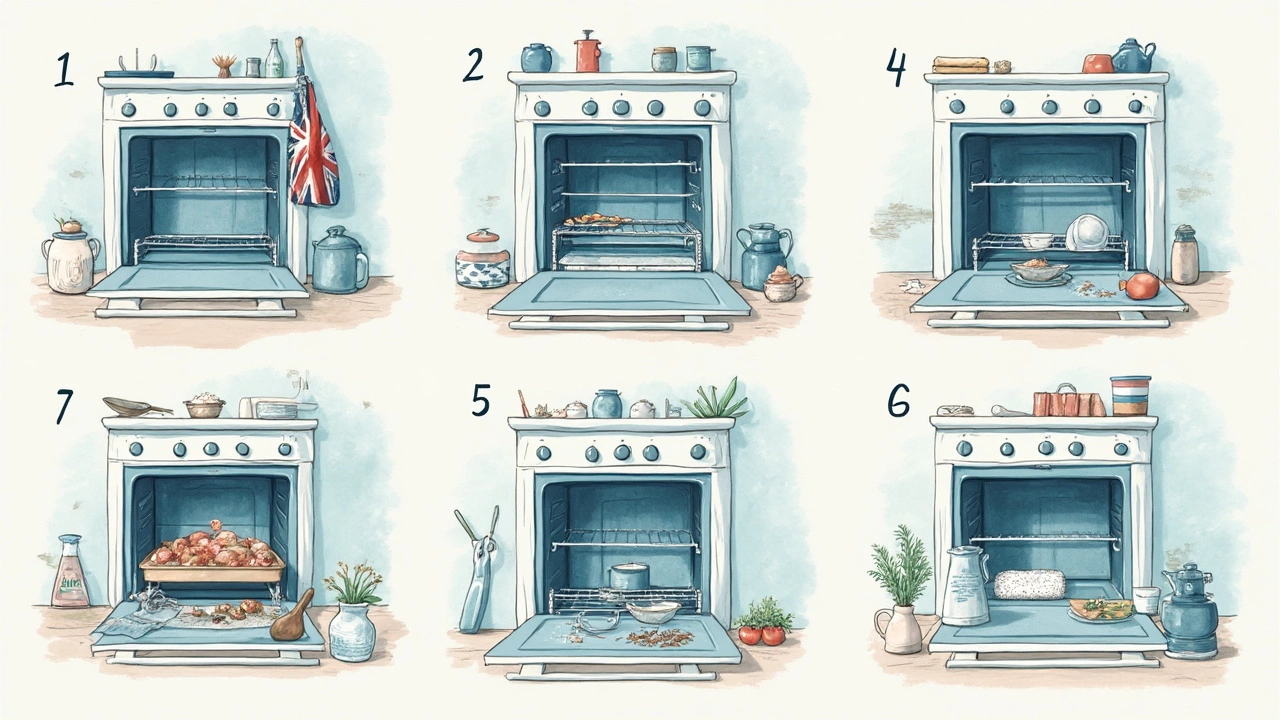Cleaning an oven is one of those chores nobody looks forward to, but it’s gotta be done. Pros have their own stash of products that tackle grime better than anything else. You won't find all of them in the average cleaning aisle, but they make the job so much easier. From industrial-grade cleaners to simple baking soda solutions—different ovens, different needs.
Let’s face it, oven cleaning can be a pain. But there are some killer techniques to make your life simpler. Pros use strategies you might not think of, like the ‘leave-it-on-and-let-it-work’ method. It sounds lazy, but it’s super effective!
- The Go-To Products for Sparkling Ovens
- Techniques Pros Swear By
- Eco-Friendly Cleaning Practices
- Avoiding Common Cleaning Mistakes
- Maintaining Your Oven for the Long Haul
The Go-To Products for Sparkling Ovens
Let’s jump right into it—when it comes to tackling that stubborn oven grime, professionals have some favorite tools in their belts. A big winner in the oven cleaning world is a cleaner called 'Easy-Off.' This heavy-duty product works wonders on baked-on messes.
If you're into something a bit less intense, baking soda combined with vinegar is a natural duo that's affordable and effective. Just make a paste with baking soda, smear it all over the greasy spots, let it sit for a while (even overnight), then spritz some vinegar and wipe away the gunk. It’s like magic, but with science.
Another favorite is Bar Keepers Friend. It’s not just for pots and pans—it boasts great results on ovens too. A simple scrub with this will have that oven shining in no time.
- Easy-Off: Great for heavy-duty jobs
- Baking Soda & Vinegar: The natural powerhouse combo
- Bar Keepers Friend: Perfect for rejuvenating surfaces
And here’s a handy stat: according to a survey by Cleaning Institute, 62% of homeowners say using the right product is half the battle won when cleaning ovens. They’re not wrong! Using the proper product takes the hassle out of the task and extends the life of the appliance.
So next time your oven is looking worse for wear, remember these pro-recommended options. A little investment in good products saves both time and elbow grease.
Techniques Pros Swear By
When it comes to oven cleaning, professionals have a toolkit of techniques that make the task a breeze. You probably won't catch them scrubbing away for hours. Instead, they let strategies do the heavy lifting.
One popular technique is the heat-and-soak method. The idea is simple: warm up the oven slightly, then turn it off. While it's still warm, apply your chosen cleaner. The heat helps break down baked-on grime, letting the cleaner penetrate more effectively. You just let it sit for 30 minutes to an hour, then wipe away the mess. It's like magic!
Steam cleaning is another trick pros love. All you need is a baking dish filled with water and some vinegar. Place the dish in a heated oven—around 200°F should do it—and let it steam for 45 minutes. The steam softens stubborn stains and grease, making them easier to remove. Just be cautious removing the hot dish, and always let the oven cool first.
Got some real tough spots? Try the baking soda paste method. It's a mixture of baking soda and water that forms a thick paste. Apply the paste on grimy spots and let it sit overnight. The next day, a damp cloth should be all you need to wipe away the softened grime.
Pro tip: Use a stainless steel scraper for the glass door. Press gently and keep the blade flat to avoid scratches. It's perfect for those sticky, burnt-on spots you just can't seem to budge.
If you’re really serious, try using an enzyme cleaner. These break down organic material, aka the food splatters and drips inside your oven. While less common for everyday folks, they’re a pro-favorite for their no-scrub power.
Here's a little secret—pros also know that consistent light cleanings work wonders long-term. Instead of waiting for the grime to cake on, they recommend doing quick touch-ups after every couple of uses. Saves time and elbow grease!

Eco-Friendly Cleaning Practices
Who says getting your oven clean needs to be harsh on the planet? There are tons of ways to keep it spotless without busting out the heavy-duty chemicals. One of the most popular methods involves everyday items like baking soda and vinegar. These two can work wonders on your oven, trust me!
Start by mixing a cup of baking soda with a bit of water to form a paste. Spread it inside your oven, avoiding the heating elements. Let it sit overnight, and then the next day, spritz some vinegar on top. Get ready for some fizzing action! Wipe it all down, and say hello to a gleaming oven.
"Baking soda and vinegar are a powerful duo that can tackle a lot of household cleaning tasks," says Jennifer, a professional cleaner who’s been in the business for over 15 years.
If you’re looking to step up your eco-friendly game, there are commercial products made from natural ingredients. Look for ones labeled biodegradable or plant-based. They can ease your cleaning process while being kind to the earth.
Bonus? Using these natural methods doesn’t just benefit the planet; it’s safer for you, your family, and your pets too. So next time, ditch the toxic stuff and go green with your oven cleaning routine. Here’s to a cleaner, greener kitchen!
Avoiding Common Cleaning Mistakes
Let's not sugarcoat it—cleaning an oven has its pitfalls. If you're not careful, you could end up causing trouble instead of fixing it. One slip-up could mean a broken heating element or even a voided warranty. Let's break down the hiccups and how to dodge them.
First off, don't trust every viral hack you see online. Some of these so-called solutions can do more harm than good. A solid rule of thumb is to stick with products and techniques the pros use. Remember, if something seems too good to be true, it probably is.
"A common mistake is using steel wool or harsh scrubbers on a self-cleaning oven. This can damage the special coating," says Lisa Monroe, a leading oven expert at CleanHouse Weekly.
Another oops moment? Forgetting to clean behind the knobs and controls. Grime can sneak in there, affecting your oven's performance. While you're at it, make sure fans and vents are free of gunk so air flows smoothly.
Also, watch out for drips and spills. These might seem like no big deal, but they can bake onto surfaces, making them a nightmare to remove later.
- Check the manual: It may sound basic, but your oven’s manual is a goldmine of dos and don’ts.
- Use the right cleaner: Not all ovens are built the same. Consult the manual to pick the right cleaner.
- Avoid soaking: Too much water is a no-no, especially for electrical parts. Stick with damp rather than drenched.
Getting your oven pristine doesn’t mean you have to stress or guess. With a little attention and using professional tips, you can avoid these typical cleaning traps. Your oven—and you—will be better for it.

Maintaining Your Oven for the Long Haul
Keeping your oven in tip-top shape doesn't have to be a chore. A little regular attention can prevent the headache of dealing with stubborn grime and the dreaded deep clean. Here are some no-nonsense tips to ensure your oven stays in great condition for years.
First off, wipe down spills right away. Fresh spills are way easier to clean than baked-on messes. Just grab a damp cloth to tackle fresh spots.
Set a regular schedule for cleaning. Once a month, give your oven a quick once-over with an oven-friendly cleaner or a baking soda solution. Trust us, this habit will make a difference.
- Remove and clean the racks separately. They tend to build up grime fast. You can soak them in soapy water before giving them a scrub.
- Check door seals regularly. A worn or crumb-filled seal can affect performance, so keep it clean and replace it if needed.
- Run the self-cleaning feature if your oven has one, but don’t overdo it. Using it twice a year should be enough to tackle any hidden dirt.
For those keen on keeping energy bills in check, a well-maintained oven runs more efficiently. Speaking of being efficient, consider ditching the aluminum foil habit, which can block airflow and cause overheating.
| Task | Frequency |
|---|---|
| Wipe Spills | Immediately |
| Clean Racks | Monthly |
| Inspect Seals | Bi-monthly |
| Run Self-Cleaning | Twice a Year |
Keep an eye out for odd smells or noises. They can be early signs of something needing attention. A quick fix now can save a big repair bill later.
